




Are you tired of opening your dishwasher only to find that your dishes still smell or have leftover food particles on them? Smelly or dirty dishes can be a frustrating problem to deal with, but luckily, there are several common causes and simple solutions to help you get your dishwasher back in top shape.
One of the most common causes of smelly dishes is a clogged drainage system. When the dishwasher drains, food particles and residue can build up in the drain, causing a bad smell. To remedy this, you can try cleaning the drain by wiping away any visible buildup and running hot water through it. If the clog is more stubborn, you can use baking soda and vinegar to break it down.
Another culprit for smelly dishes is a dirty interior. Over time, a buildup of food particles and mildew can occur on the walls and seals of the dishwasher. This can lead to musty or unpleasant odors. To clean the interior, wipe down the walls and seals with a mixture of vinegar and water. This will help eliminate any odors and remove any residue that may be causing the smell.
If your dishwasher still stinks even after cleaning the interior and drainage system, the heating element may be the problem. Sometimes, when the heating element malfunctions, it can cause the dishwasher to not properly heat the water during the washing cycle. This can result in a bad smell lingering on the dishes. If this is the case, it’s best to contact a professional to repair or replace the heating element.
To avoid smelly dishes in the future, there are a few tips you can follow. First, make sure you’re using the right detergent for your dishwasher. Some detergents may not clean as effectively, leaving behind residue and causing a bad smell. Second, be mindful of what you’re putting in the dishwasher. Avoid washing plastic items, as they can retain odors more easily. Lastly, watch out for any signs of clogs or blockages in the dishwasher’s drainage system and address them promptly to prevent any buildup and bad odors.
Common Causes of Dishwasher Smells
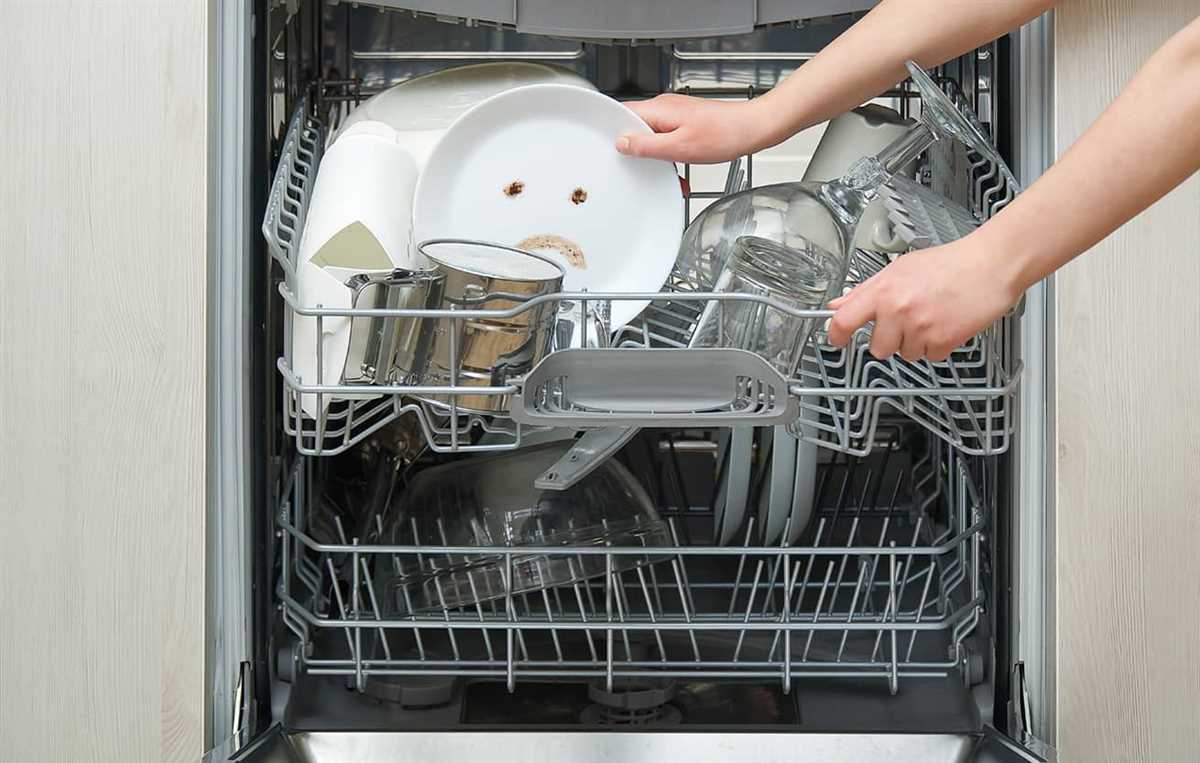
Smelly odours coming from your dishwasher can be a frustrating problem. However, understanding the most common causes can help you troubleshoot and find solutions to eliminate the smells.
1. Food particles and residue
One of the most common causes of dishwasher smells is leftover food particles and residue that haven’t been cleaned properly. This can happen if dishes aren’t rinsed before loading them into the dishwasher or if the dishwasher isn’t doing its job properly. To solve this issue, always scrape off excess food and rinse dishes before loading them.
2. Clogged drain and filters
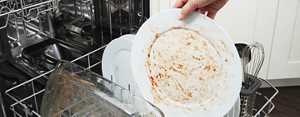
A clogged drain or filters can cause odours to build up in your dishwasher. If the dishwasher isn’t draining properly, it can lead to water stagnation, which can create a foul smell. To unclog the drain and filters, check for any blockages and remove them. Regularly cleaning and maintaining the dishwasher can prevent this issue in the future.
3. Mold and mildew
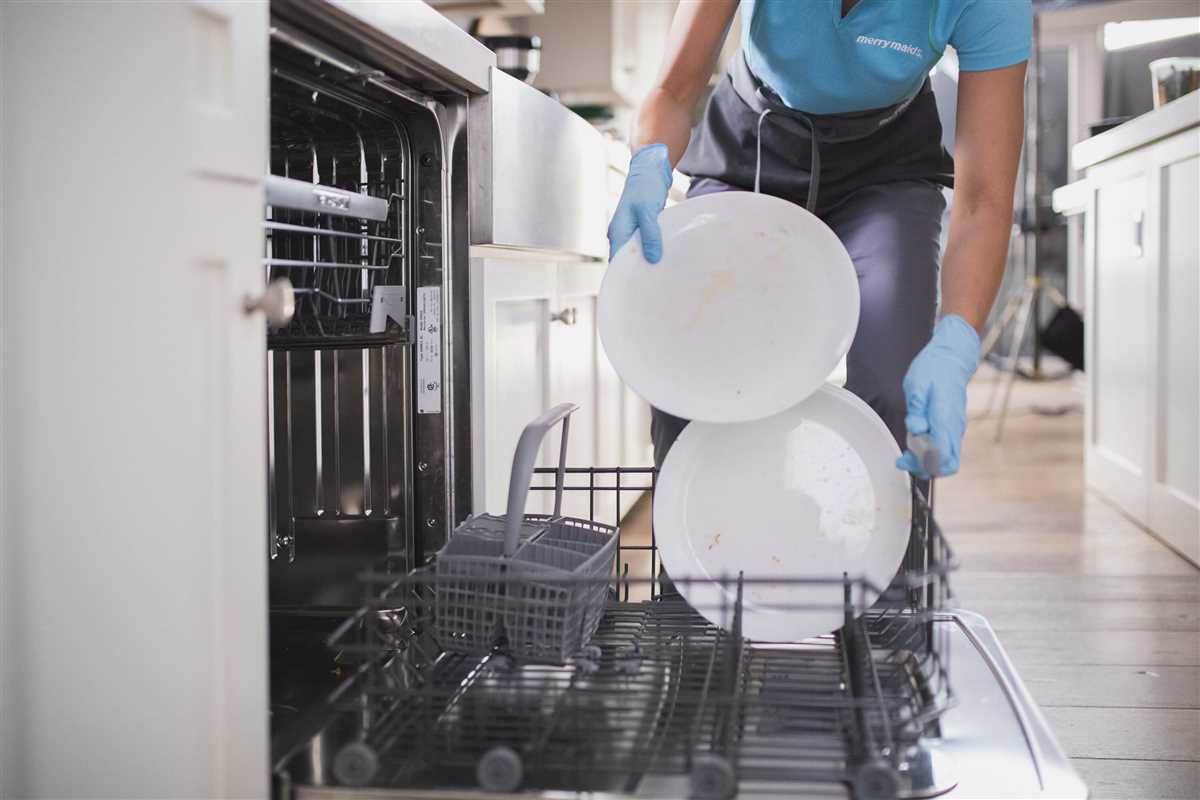
Mold and mildew thrive in moist environments, making dishwashers a perfect breeding ground. If your dishwasher smells musty or moldy, it’s likely that there is mold or mildew growing in hidden areas, such as the gasket or the dishwasher walls. To get rid of mold and mildew smells, clean these areas with a mixture of vinegar and hot water. Running a cycle with vinegar can also help eliminate odours.
4. Heating element issues
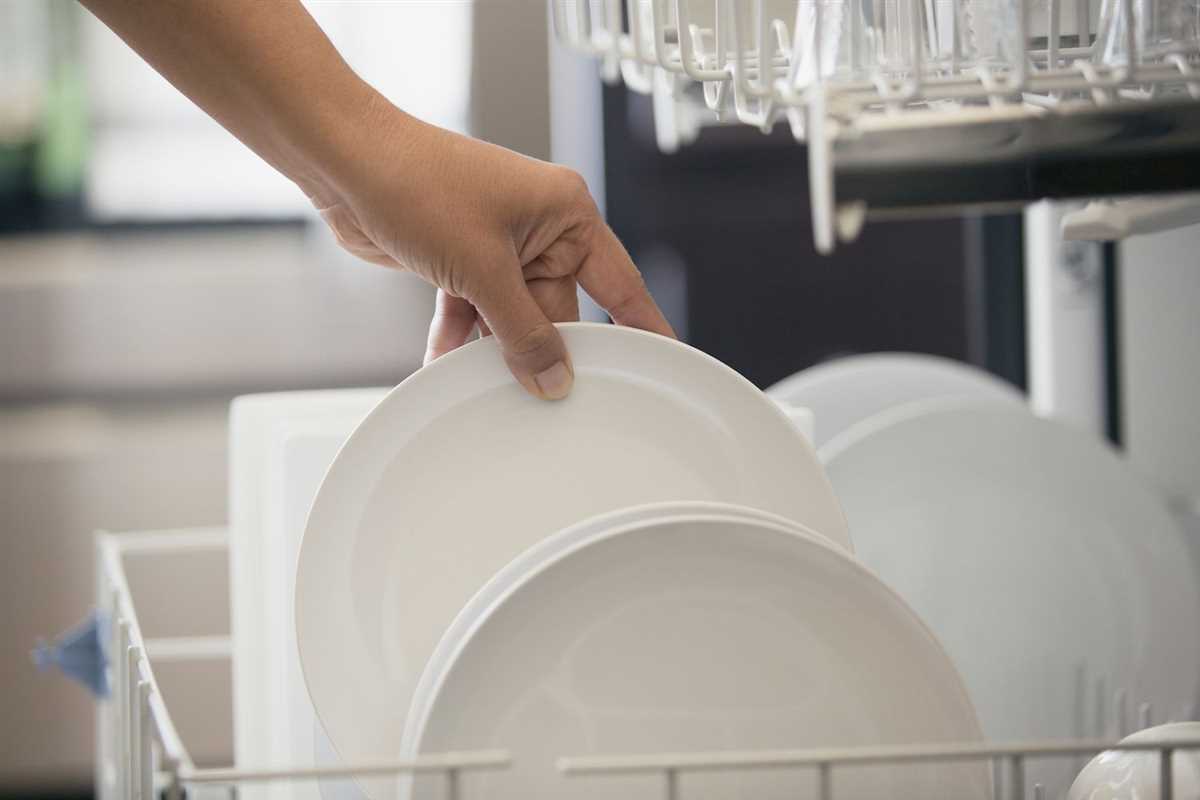
If your dishwasher smells like burning or overheating, it could indicate a problem with the heating element. This can cause plastic materials to release unpleasant smells when exposed to high temperatures. Check the heating element for any visible damage or malfunctioning and contact a professional if necessary.
5. Bad seals or gaskets
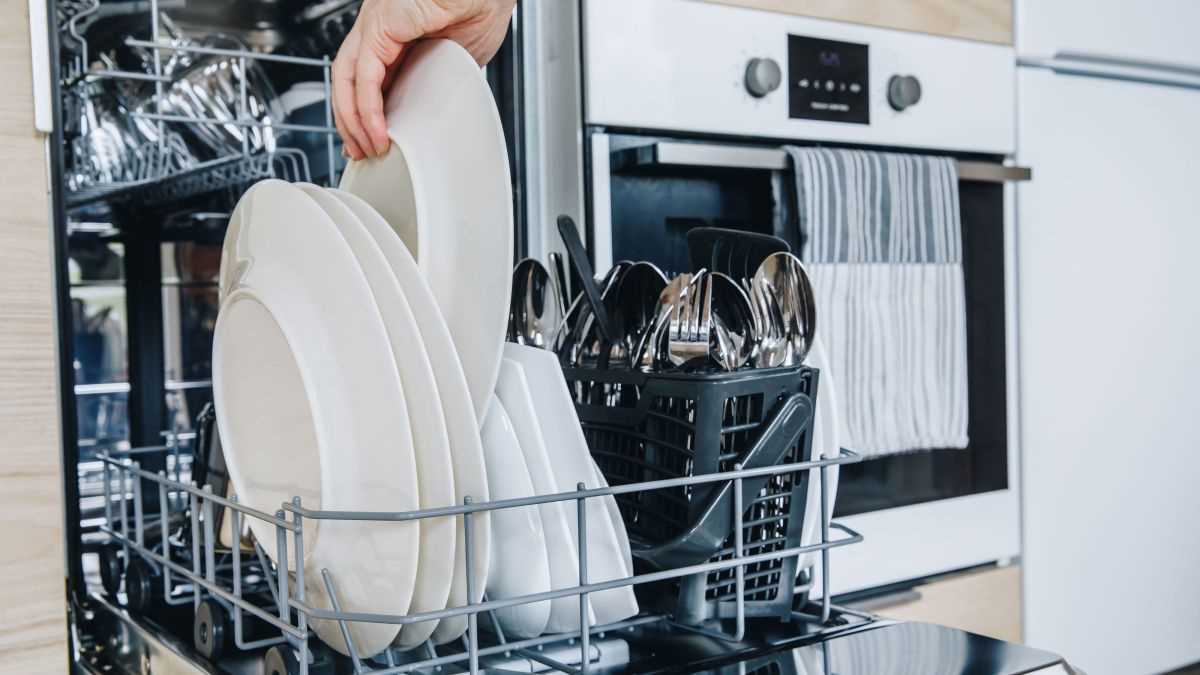
Leaky seals or gaskets can allow water to accumulate in areas of the dishwasher and cause unpleasant odours. Check the seals and gaskets for any signs of wear or damage. If they’re not sealing properly, they may need to be replaced to prevent water leakage and subsequent odours.
6. Dishwasher-safe plastics
Plastic items in your dishwasher, especially if they’re not designated as dishwasher-safe, can emit a strong smell when exposed to high temperatures. Make sure to only place dishwasher-safe plastic items in your dishwasher to avoid unpleasant smells.
By identifying the causes of the smells and implementing the appropriate solutions, you can keep your dishwasher running efficiently and odour-free. Regular maintenance and proper cleaning procedures will ensure that you’re always greeted with fresh and clean dishes.
Possible Solutions for Smelly Dishes
If your dishes have a buildup of unpleasant smells, there are several solutions you can try to solve the problem. Here are some possible causes and solutions for smelly dishes:
1. Incorrect loading
One of the most common causes of smelly dishes is incorrect loading. If you overload the dishwasher, it can prevent proper water circulation and result in dirty dishes. Make sure to leave enough space between dishes for water to reach all surfaces and avoid overcrowding.
2. Rinse dishes before loading
To prevent food particles from sticking and creating unpleasant smells during the wash cycles, it’s recommended to rinse your dishes before loading them into the dishwasher. This will help remove any leftover food and ensure cleaner and fresher dishes.
3. Clean the dishwasher
If your dishwasher itself is dirty, it can contribute to smelly dishes. Clean the dishwasher regularly to remove any trapped food particles or mold growth. Use a dishwasher-safe cleaning solution or run an empty cycle with a cup of white vinegar or baking soda to eliminate odors.
4. Check the seal
The rubber seal around the dishwasher door is important for preventing water leakage and maintaining an airtight environment. If the seal is damaged or dirty, it can allow smells to escape into the kitchen. Regularly inspect the seal and clean it if necessary. If the seal is cracked or worn, it may need to be replaced.
5. Check the drain
A clogged or dirty dishwasher drain can contribute to bad smells in your dishes. Check the drain for any clogs or buildup and clean it regularly to ensure proper drainage. You can use a pipe cleaner or a solution of vinegar and baking soda to remove any blockages.
6. Use the right detergent
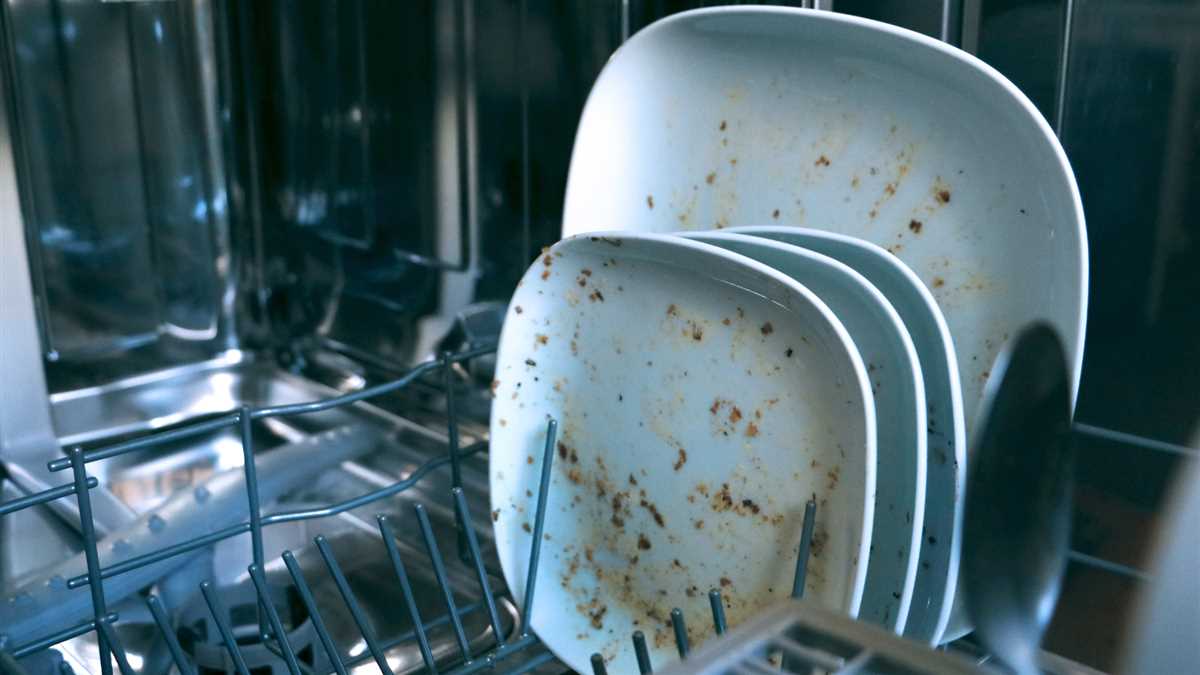
Using the wrong detergent or not using enough detergent can result in dishes that aren’t properly cleaned and may have residual smells. Make sure you’re using a dishwasher detergent that is suitable for your dishwasher and follow the recommended dosage for best results.
7. Run a hot water cycle
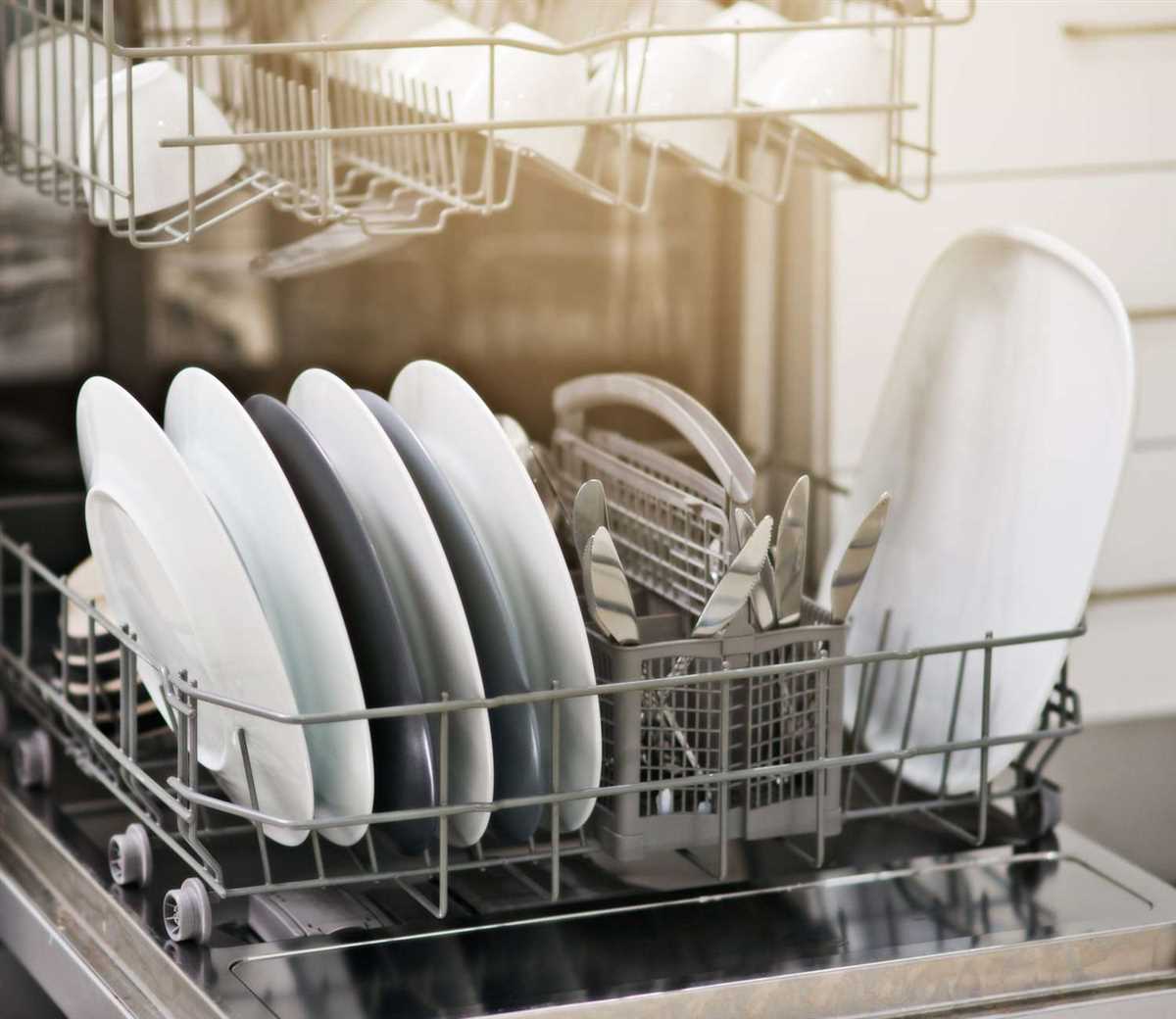
To eliminate any lingering smells or buildup in your dishwasher, run a hot water cycle without any dishes or detergent. This will help flush out any remaining particles and bacteria, leaving your dishwasher smelling fresh and clean.
By following these solutions, you should be able to tackle the issue of smelly dishes and enjoy cleaner, odor-free results from your dishwasher.
Understanding the Causes of Dirty Dishes
Owning a dishwasher can be a convenient way to keep your dishes clean and save time. However, if you find that your dishes are coming out dirty, it can be frustrating and leave you wondering what could be causing the problem. In this article, we will explore some of the possible causes of dirty dishes and offer solutions to help you resolve the issue.
1. Choosing the wrong dishwasher cycle
One common mistake that can lead to dirty dishes is selecting the wrong dishwasher cycle. Different cycles are designed to tackle different levels of dirt and grease. If you choose a cycle that is meant for lighter loads, it may not be powerful enough to clean heavily soiled dishes. To ensure optimal cleaning, select a cycle that matches the level of dirtiness on your dishes.
2. Malfunctioning dishwasher components
If your dishwasher is not running smoothly, it may not be effectively cleaning your dishes. A malfunctioning spray arm, clogged filter, or broken detergent dispenser can all contribute to dirty dishes. It is important to regularly inspect and maintain these components to ensure they are working properly. If you notice any issues, consult your dishwasher’s manual or contact a professional for repairs.
3. Overloading dishes and obstructing water flow
Overloading your dishwasher with dishes can obstruct the water flow and prevent proper cleaning. Ensure that there is enough space between dishes for water and detergent to reach all surfaces. Placing dishes too close together, particularly those made of plastic, can result in poor cleaning and trapped food particles. By spacing out your dishes evenly and avoiding overcrowding, you can improve the cleaning efficiency of your dishwasher.
4. Improper pre-rinsing or scraping
While it is important to scrape off excess food before loading your dishes into the dishwasher, there is no need to pre-rinse them. In fact, dishwasher detergents are designed to break down food particles, so rinsing dishes beforehand can actually prevent the detergent from working effectively. However, large food particles should be scraped off to prevent them from clogging the dishwasher’s drain or spray arm.
Tip: If you notice a lingering smell coming from your dishwasher, try running a cleaning cycle with baking soda or vinegar. These natural ingredients can help remove odours and built-up residue, leaving your dishwasher smelling fresh.
In conclusion, dirty dishes in your dishwasher can be caused by a variety of factors, from choosing the wrong cycle to malfunctioning components. By checking and addressing these potential causes, you can ensure that your dishes come out clean and smelling fresh after every wash.
How to Address Dirty Dishes Issue
If you’re finding that your dishes are dirty again after running them through a dishwasher cycle, there could be several possible causes for this problem. Here are some simple steps you can take to address the issue:
1. Check for Particles
Before running the dishwasher, make sure there are no food particles or debris on the dishes. Simply wiping off any food particles or residue can help prevent them from recirculating and dirtying other items during the washing process.
2. Choose the Correct Cycle and Load Correctly
Ensure that you are selecting the appropriate wash cycle for your dishes. Using the wrong cycle or overloading the dishwasher can prevent the dishes from getting properly cleaned. It’s important to arrange the dishes properly in the dishwasher, avoiding overcrowding and ensuring that water can reach all surfaces.
3. Clean the Interior and Filters
Regularly clean the interior of the dishwasher, including the walls, racks, and filters. Sometimes, remaining food particles can get trapped and lead to odors or ineffective cleaning. You can use a dishwasher-safe sponge or cloth to wipe away any residue, or remove and clean the filters for a more thorough cleaning.
4. Check the Dishwasher Seal and Gasket
Inspect the dishwasher seal and gasket for any signs of damage or wear. A faulty seal or gasket can allow air to escape during the wash cycle, resulting in poor cleaning performance. If you notice any issues, contact a professional technician to repair or replace the seal or gasket.
5. Address Smells and Mildew
If your dishwasher smells or has mildew growth, there are a few steps you can take to eliminate these odors. Sprinkle baking soda or pour white vinegar onto the bottom of the dishwasher and run a cycle without any dishes. Alternatively, you can use dishwasher-safe tablets or powders specifically designed to remove odors. Additionally, leaving the dishwasher door open after a cycle can help air out the interior and prevent mildew.
By following these tips, you can solve the issue of dirty dishes and ensure that your dishwasher is running efficiently. If the problem persists, it may indicate a malfunctioning dishwasher, and you should contact a professional for further assistance.
Preventing Smelly and Dirty Dishes
When your dishwasher isn’t running smoothly or your dishes come out smelling bad and still covered in dirt, it’s time to take action. By addressing the causes and implementing the right solutions, you can ensure that your dishes come out clean and odor-free in the future.
Causes of Smelly and Dirty Dishes
- Blocked or clogged drain: A common cause for smelly dishes is a clogged drain in your dishwasher. Food particles and residue can build up over time, causing foul odors and preventing proper drainage.
- Hard water residue: If you have hard water, it can leave mineral deposits on your dishes even after they’ve been washed. This can make them appear dirty and affect their smell.
- Mold or mildew growth: Sometimes, mold or mildew can grow in the hidden corners of your dishwasher, leading to a musty odor on your dishes.
Solutions for Smelly and Dirty Dishes
To get rid of smelly and dirty dishes, here are some tips you can try:
- Clean the dishwasher filter: The dishwasher filter is an important element that helps to trap food particles and debris. Regularly cleaning it can prevent clogs and ensure proper drainage.
- Check the drain: If your dishwasher still smells even after cleaning the filter, the drain might be clogged. Remove any visible debris and use a mixture of vinegar and water to unclog it.
- Run an empty cycle with vinegar: sometimes, simply running an empty cycle with vinegar can eliminate odors and remove any lingering residue.
- Wipe and clean the interior: Regularly wipe down and clean the interior of your dishwasher to prevent mold and mildew growth. Use a mixture of baking soda and water to scrub away any stubborn stains or odors.
- Use the right detergent: Ensure you’re using the right dishwasher detergent and that you’re using the correct amount. Using too little detergent can result in dirty dishes, while using too much can leave a residue.
By following these tips and implementing these solutions, you can keep your dishwasher smelling fresh and your dishes clean. Remember to regularly maintain and clean your dishwasher to prevent any future issues.
FAQ
Why do my dishes still smell after washing them in the dishwasher?
If your dishes still smell after washing them in the dishwasher, it could be due to a few different reasons. One common cause is that there is food residue or debris trapped in the dishwasher’s filter or spray arms. To fix this, you can remove and clean these parts thoroughly. Another possible cause is that the dishwasher is not getting hot enough to properly sanitize the dishes. You can try running the dishwasher on a hotter setting or checking if the heating element is working properly. Additionally, using a dishwasher cleaner or vinegar can help remove any lingering odors.
What could be causing my dishwasher to leave a film or residue on my dishes?
If your dishwasher is leaving a film or residue on your dishes, there are a few potential causes to consider. First, it’s possible that your dishwasher’s spray arms or nozzles are clogged or blocked, preventing water from properly rinsing the dishes. Cleaning these parts and ensuring they are free of any debris can help resolve the issue. Another possible cause is hard water, which can leave behind mineral deposits on your dishes. Using a rinse aid or water softener can help prevent this. Lastly, using too much detergent or the wrong type of detergent can also lead to a film or residue on dishes. Make sure you are using the appropriate amount and type of detergent for your dishwasher.
Why does my dishwasher smell bad?
If your dishwasher has a bad smell, it could be due to a few different reasons. One common cause is trapped food particles or debris in the dishwasher’s filter or drain. Cleaning these parts thoroughly can help eliminate the odor. Another possible cause is a build-up of bacteria or mold in the dishwasher. Running a cleaning cycle with a dishwasher cleaner or using a solution of vinegar and baking soda can help get rid of these odors. Additionally, it’s important to regularly clean the door gasket and any other areas where food residue may accumulate to prevent any unpleasant smells.
Why are my dishes coming out of the dishwasher dirty?
If your dishes are coming out of the dishwasher dirty, there could be a few reasons to consider. First, it’s possible that the dishwasher’s spray arms or nozzles are clogged or blocked, preventing water from properly reaching all the dishes. Cleaning these parts can help resolve the issue. Another possible cause is overloading the dishwasher, which can lead to poor water circulation and inadequate cleaning. Make sure you are not overloading the dishwasher and giving each dish enough space. Additionally, using the correct amount and type of detergent for your dishwasher is important for getting clean dishes.
How can I prevent my dishwasher from smelling in the future?
To prevent your dishwasher from smelling in the future, there are a few steps you can take. First, make sure to scrape any excess food off your dishes before loading them into the dishwasher. This will help prevent food particles from getting trapped in the dishwasher. Additionally, regularly cleaning the filter, spray arms, and drain of the dishwasher can help prevent build-up of food debris and bacteria. Running a cleaning cycle with a dishwasher cleaner or a solution of vinegar and baking soda every few months can also help maintain a fresh-smelling dishwasher.












